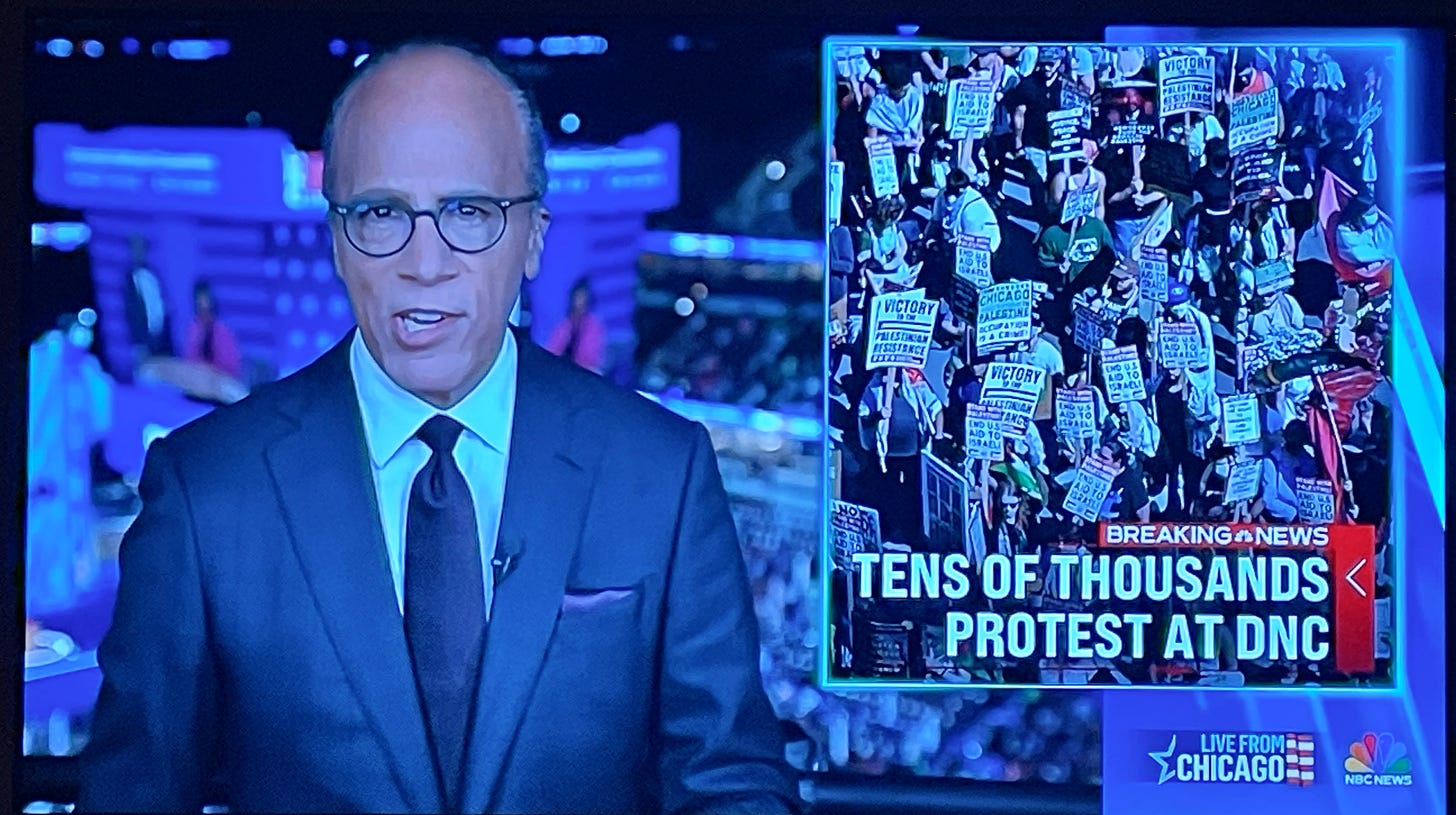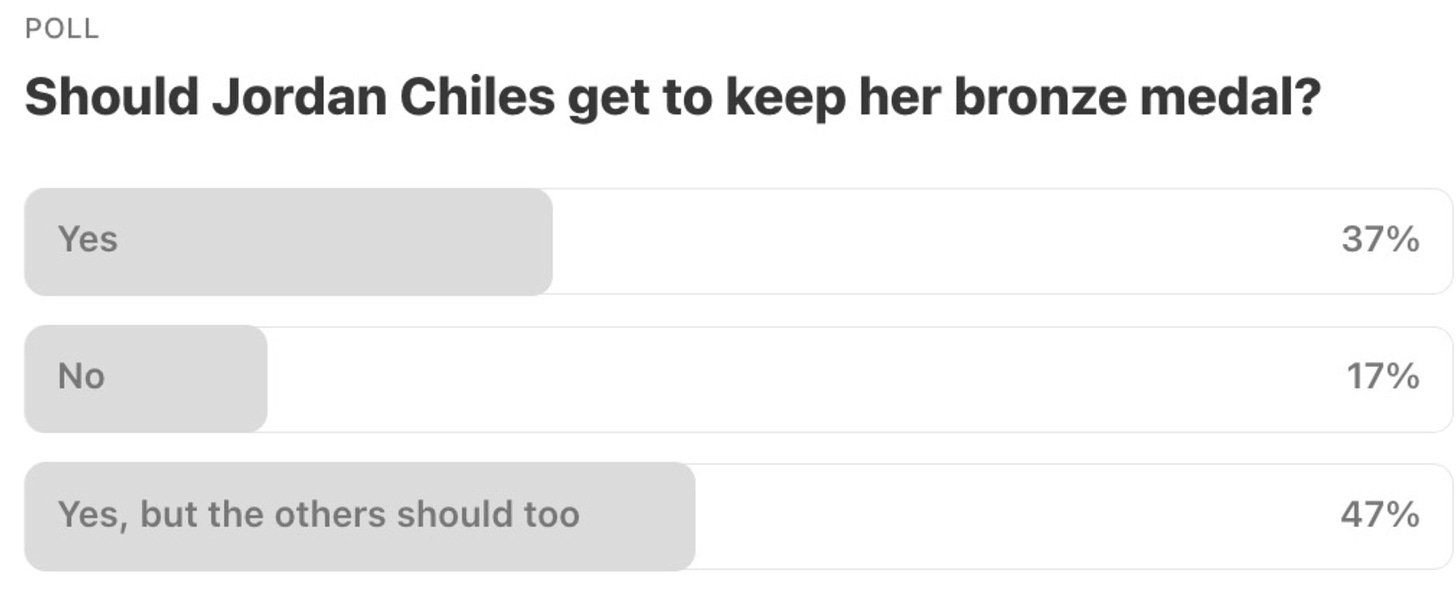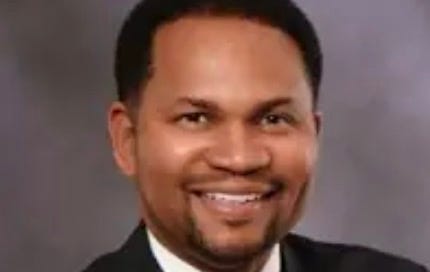
Zorn: DNC protesters lost the expectations game
It was a strange choice to predict huge numbers for a protest that turned out modest numbers
To read this issue in your browser, click on the headline above.
Eric Zorn is a former opinion columnist for the Chicago Tribune. Find a longer bio and contact information here. This issue exceeds in size the maximum length for a standard email. To read the entire issue in your browser, click on the headline link above. Paid subscribers receive each Picayune Plus in their email inbox each Tuesday, are part of our civil and productive commenting community and enjoy the sublime satisfaction of supporting this enterprise.
Tuesdays at 11:30 a.m. I talk with WGN-AM 720 host John Williams about what’s making news and likely to be grist for the PS mill. The WGN listen-live link is here.
What I’m wondering about Monday’s DNC protests
I wonder what protest organizers were thinking when projecting in court filings up to 25,000 marchers for Monday’s march near the Democratic National Convention at the United Center. Other news stories had them touting as many as 40,000 attendees.
The number fell far, far short of that on a perfect summer day, giving rise to the idea that the protest was something of a bust, when in other circumstances a march by several thousands citizens — I haven’t seen a solid, consistent estimate — would have been impressive.
Did no one tell them how to play the expectations game?
I wonder why the NBC News graphics department didn’t adjust to this reality on the fly.
I wonder what the city was thinking by limiting to seven the number of portable toilets in Union Park for the demonstrators. Even with a turnout that was small compared to the projections, lines were long.
I wonder why protesters armed with just a small mallet were able to breach one of the outer security fences outside the United Center. “ We were briefed on the security of the convention multiple times by Homeland Security. CPD, FBI and so forth,” Chicago Congressman Mike Quigley told Fox32’s Paris Schutz. “This was what we were told was unscalable, unbreachable fencing. This isn't supposed to be happening”
I wonder if the ho-hum coverage of the protests will inspire more dramatic acts of disruption as the week goes on.
About the demands of the protesters
A reader called my attention to the list of demands on flyers for the media being handed out by March on the DNC and asked, “How many of these demands does the Democratic Party already agree with, or mostly agree with, and how many do the Republicans agree with, or mostly agree with?
I’ll go down the list, which the organization has explained further here.
As one who believes that the Israel/Palestine question is very complicated and involves compromises on basic values either way. I make no claim to expertise or insight into that volatile and historically fraught issue or just what “Stand with Palestine!” is supposed to mean. The “from the river to the sea” signs and attacks on Zionism and Israel’s right to exist don’t resonate with me, though calls for peace and a successful cease-fire negotiation do.
Money for jobs, schools, healthcare, housing and the environment, yes. But anyone who thinks the U.S. should not also maintain a strong military is naïve, and I disagree with the implication that we should not help fund Ukraine in its war against Russia, for example.
The question of what to do about migrants seeking asylum or simply a better life in the United States is also very complicated. Immigration has long been this country’s lifeblood, but “legalization for all” sounds a lot like the call for open borders that is politically toxic.
The Democratic Party is far, far better at protecting LGBTQ and reproductive rights and the rights of labor than the Republican Party, and anyone who suggests there is no difference between the parties here or it doesn’t matter who is president when it comes to these issues is a fool.
Civilian oversight of policing and changes in police training to reduce police “crimes” is an important if vague demand, though not as vague as “Justice, peace and equality for all.” I’m not sure what “equality for all” means either generally or in specific, policy terms.
It’s blind not to realize that the Democratic Party is far, far friendlier to these demands than the Republican Party, and also to realize that the best route toward progress on these goals is to get behind Democratic candidates, however imperfect they may seem to be.
Veteran local lefty Andy Thayer had a provocative op-ed in Monday’s Tribune highlighting the virtues of”mass youth disaffection from traditional institutions,” which he credits with being the engine of true social change:
For those truly wanting social progress, periods of mass disaffection from both parties hold great promise for rapid change on long-delayed reforms. … Moderates who insist on staying the course for incremental reform are sticking to a half-century-old strategy that has only fueled the right to grow ever bolder and more vicious with each decade. Democrats appear to dither while the far right promises “action.” …
Yes, a Trump revenge presidency would be a dire threat to many. But a half century of a sleepwalking center that made bold promises to working people and then discarded them upon reaching office has led us to this sorry juncture.
Hat tip to the phrase “Trump revenge presidency.” And a salute, also, to those who dare to stake out and defend positions that don’t necessarily poll well but have a moral urgency. But I would counter Thayer’s assertion about moderates by saying that radical thinkers who cast symbolic votes for marginal candidates or sulk at home on Election Day are sticking to a “the worse the better” strategy that has retarded the causes he back and has ultimately aided the rise of the “vicious” right.
Sure, a President Kamala Harris would not likely govern as a radical, Republican scare slogans notwithstanding. But damaging her candidacy over impatience at her moderate positions increases the risk that Trump and his minions will attempt to undo decades of progress on the fronts that Thayer (and I to a large extent) care about.
Notes and comments from readers — lightly edited — along with my responses
More money, better schools?
Jeff Pieler — In your scolding of Mayor Brandon Johnson for his reported effort to oust the CEO of the Chicago Public Schools for failing to take fiscally irresponsible steps to meet the demands of the teachers’ union, you wrote “State and federal officials need to step up and provide more money for education.” This is the reflexive (and publicly acceptable) response to education issues, but I find it maddening.
Is there evidence of a positive correlation between spending and student achievement either in CPS or nationally? Is the Chicago Teachers Union even interested in student achievement? Are those in the education industry ready to outline the specific, measurable education benefits that will result from additional funds? Will they personally suffer any tangible consequence from failing to achieve those results? Can we achieve better results without spending more money?
Zorn — Certainly there is not a one-to-one correlation, but you do have to ask yourself why taxpayers in upper-income suburbs are willing to fund generously their high-performing schools. If money didn’t make a difference in outcomes, the laws of economics would suggest they’d call for massive cuts.
For evidence, I’d direct you to “Does Money Matter in Education?” by the Albert Shanker Institute, where the executive summary states:
On average, aggregate measures of per-pupil spending are positively associated with improved or higher student outcomes. The size of this effect is larger in some studies than in others, and, in some cases, additional funding appears to matter more for some students than for others. Clearly, there are other factors that may moderate the influence of funding on student outcomes, such as how that money is spent. In other words, money must be spent wisely to yield benefits. But, on balance, in direct tests of the relationship between financial resources and student outcomes, money matters.
A more balanced 2017 report from the Brookings Institution, “It’s not nothing: The role of money in improving education” said the impact of more money for schools isn’t simple easy to calculate because of the many variables, but…
Two recent studies concluded that changes in spending induced by state education finance reforms improved outcomes such as test scores, high school graduation, and earnings. …. Money can matter, but spending more on schools does not yield big improvements.
I do think that the vast majority of schoolteachers — public and private— are interested in student achievement, and I respect and acknowledge the challenges many of them face when dealing with disadvantaged student populations. Since there are many variables and clearly not a one-to-one correlation between dollars invested and, say, standardized test results, no one would be able to make specific promises.
My Thoughts For All — The Chicago Public Schools should take a look at the solution of those small towns in the Midwest who lost population, their school attendance numbers were shrinking and they were threatened with higher taxes. They consolidated schools — especially high schools which had dropped to under 100 students — with the nearby towns. Kids had to ride buses when before they walked. No one suffered. It made a lot of sense for many reasons. CPS could follow their lead and consolidate high schools with less than 100 students as a start. Close the excess buildings, reassign the teachers/staff to schools currently shorthanded. Just getting rid of the upkeep of the almost vacant schools would be a start to smart financial steps. Two examples are: Douglass High School has 33 students, Simpson Academy has 27. Why would anyone keep a high school with 33 students open when the schools can be merged for a much better high school experience all around.
Paul Nowick — Like you, I was in Boston in 2004 for Obama’s highly touted and subsequently acclaimed DNC keynote speech. I arrived early at Fleet Center to ensure I’d have a great seat because I anticipated the speech would be a make or break opportunity for Obama.
I’d hoped the speech would include new concepts and ideas. Instead I heard soaring cliches, but nothing substantively new. When it concluded, before I left my seat, I called a politically conservative friend to say “nothing to be concerned about with this Obama fellow - just a bunch of old though we’ll delivered rhetoric.
Well, I couldn’t have been more wrong. Like you I was quite surprised by the widespread acclaim for a speech I considered so-so. Thought I was the only person who felt that way, until I read the Picayune Sentinel!
Keep up your good work. I’m politically conservative, but find your columns balanced, informative and fun. Plus they’re well written and it’s a rare treat to read well crafted journalism.
Zorn — Thanks. I don’t usually post flattering passages from letters but I’m doing so here because I can tell from several very angry emails I got last week that we are entering the Toxic Presidential Election Zone — that period of time when angry rhetoric ratchets up and people grow even less tolerant of opposing views than they normally are.
I first noticed this is 2008 when the comments section of my blog at ChicagoTribune.com, normally a chippy but relatively civil place, became a cesspool of invective as the race between Obama and Republican John McCain went to the wire. It was so bad that I turned off comments before subsequent presidential election to try to keep a lid on the anger.
I have no plans to do that here — the Picayune Sentinel’s first presidential election season — because the commenters here have so far proven tough but fair, for the most part, and the temperature isn’t anywhere close to too high. I am prepared to lose some readers over my ill-disguised contempt for Trump and Trumpism, but I’m more than willing to continue to let his defenders among paying subscribers post their defenses of him and their critiques of Kamala Harris.
David Leitschuh — I take exception to your statement that Vice President Kamala Harris has never been the "Border Czar." While there is of course no official role by that title, It was widely used by many mainstream news outlets after President Biden delegated authority to Harris for border security.
She was officially tasked by President Biden on March 24, 2021, “to lead our efforts with Mexico and the Northern Triangle…in stemming the movement of…migration to our southern border.”
The flood of illegal immigration into this country under the Biden / Harris administration is the primary concern of many citizens and a salient voting issue.
Zorn — Did you read the White House speech transcript you linked to? Harris was given a specific task of dealing with the Northern Triangle countries to try to alleviate some of the conditions causing mass migration— not told to create or oversee "the border." Mainstream news outlets were lazy and wrong to use the term "Border Czar," you are lazy and wrong to repeat it.
The “flood” has been stanched, to the dismay of those wailing about “open borders.” Here’s USA Today last week:
Along the U.S.-Mexico border, migrant apprehensions plunged in July from a year ago, to the lowest level of the Biden era, according to U.S. Customs and Border Protection statistics. … Migrant crossings have declined every month for the past five months. The results mark a rare victory on one of the Biden administration's toughest political battlefronts
That said, I agree with you that Harris needs to engage these and other questions with neutral reporters in interviews and news conferences. Trump "debates" are kind of a circus, but yeah, why not three?
Joanie Wimmer — The person President Biden charged with border security, among other things, was the Secretary of the Department of Homeland Security, Alejandro Mayorkas. In the role actually assigned to her, Harris secured a commitment from the private sector to invest over $5 billion to promote economic opportunities and reduce violence in the region.
JakeH --Three reasons why it's actually good to have some inflation. Three reasons:
1. If prices stop rising or go down (deflation), it reduces the incentive to spend today and increases the incentive to hold out for a better deal, which slows the economy.
2. If prices stop rising or go down, income will likely come down, making it harder to pay back loans taken when prices were higher, leading to an inability to pay back loans, and additionally disincentivize further borrowing, which is the life-blood of the economy.
3. If prices stop rising or go down, the price of borrowing lowers to near nothing, which hampers the ability of national banks to stimulate the economy by lowering interest rates, because there's nowhere to go.
Zorn — Republicans are not going to stop saying that inflation is out of control even though it’s now fallen to fairly normal rates.
Marc Martinez — Democrats have raised somewhere around $100 million for their big show this week in Chicago, and it seems like they could make better use of that money in the campaigns. It doesn't even seem very well targeted to be a party that helps to goose the enthusiasm of the street level campaign workers.
Mark K — I thoroughly enjoyed your dad's explanation of the principle behind ShotSpotter. Wrapped in an interesting personal story, with a little humor, he made a somewhat complicated concept so easily accessible. My grandfather was a geometry professor and one of my fondest memories of him was when he helped me with a homework problem that had nearly driven me to tears before he just happened to visit. Your Dad's letter reminded me of that. Thank you for sharing it!
Meanwhile, I have to join the vast majority of you readers in disagreeing with your take, “Jordan Chiles deserves a bronze medal but shouldn’t get one. Fight me” You wrote that "even stupid and arbitrary rules have to be enforced until they are officially changed." There are many laws around the country that are just plain silly and are not enforced, like one law on the books in Vermont where a woman needs written permission from her husband in order to obtain dentures. Should this law be enforced?
At the other extreme, imagine a convicted murderer slated to be executed, and the night before the execution indisputable DNA evidence of his innocence comes to light. His appeals processes have all been exhausted, there is no legal process to introduce this new evidence. Should he still be executed? Laws are sometimes unjust and what is right is sometimes not legal. Sometimes it's impossible and wrong to wait until a rule is changed when it is clear it is not on the right side. It's clear Chiles earned her medal, she should keep it.
Zorn — I did get clobbered by more than 400 voters in the associated click poll:
And if the other, higher venues for appeal rule in her favor I will be pleased and satisfied. But rules need to be followed until they’re officially changed or overturned through the normal review process. In the hypothetical case of a woman in Vermont suffering a penalty for buying dentures without her husband’s permission (and what was she thinking???) I’m sure a higher court would invalidate the law as well as her conviction. In the case of a condemned prisoner found to be innocent at the last minute by DNA evidence, the U.S. Supreme Court has the power to step in and halt the execution.
Garry Spelled Correctly — Sally Jenkins of the Washington Post really destroys the ruling against Chiles here.
Loren Santow — Regarding your reader’s suggestion of a song by The Warning as the Tune of the Week, that band got on my radar a decade ago with their cover of Metallica’s Enter Sandman. They were just kids––literally––and play the sh*t out of it.
Zorn — Yeah. Before posting it would have paid for me to have checked Wikipedia, which notes that, in 2014 when the girls the The Warnning were just ages 9 through 14,” their rendition of “Enter Sandman” got 25 million views.
The week’s best visual jokes
Here are some funny visual images I've come across recently on social media. Enjoy, then evaluate:
The answer to the cheeseburger question is pretty easy to find online as well as fairly obvious.
There’s still time to vote in the conventional Quip of the Week poll!
Thank you for supporting the Picayune Sentinel. To help this publication grow, please consider spreading the word to friends, family, associates, neighbors and agreeable strangers.
Contact
You can email me here:
I read all the messages that come in, but I do most of my interacting with readers in the comments section beneath each issue.
Some of those letters I reprint and respond to in the Z-mail section of Tuesday’s Picayune Plus, which is delivered to paid subscribers and available to all readers later Tuesday. Check there for responses.
If you don’t want me to use the full name on your email or your comments, let me know how you’d like to be identified.





























"In the case of a condemned prisoner found to be innocent at the last minute by DNA evidence, the U.S. Supreme Court has the power to step in and halt the execution."
No, it doesn't. NO court "steps in" on anything; a case must have been brought before it by the parties. And, frankly, the current Supreme Court, in the example given, would very likely allow the execution to proceed, the defendant having exhausted all legal remedies
“If money didn’t make a difference in outcomes, the laws of economics would suggest they’d call for massive cuts. “
In Oak Park, there is a strong desire to spend more money on schools, even as the performance and ranking of the schools unarguably declines. After soaking in this for 35 years, I doubt the connection between spending and performance at the high end. I see it as a luxury good. The luxury isn’t just the high-end facilities (we are building a new pool that will cost $120 million unless it overruns its budget.). The luxury is the satisfaction of having the highest paid teachers and the most numerous specialists and administrators.
The high taxes are effectively their own benefit, like the price of a Ralph Lauren shirt in the 80’s. We spend whatever is asked here and if you don’t like that or can’t afford it, Oak Park is not for you. Move your family to Elmhurst or Lagrange, or Berwyn or Chicago if your kids are done with school.